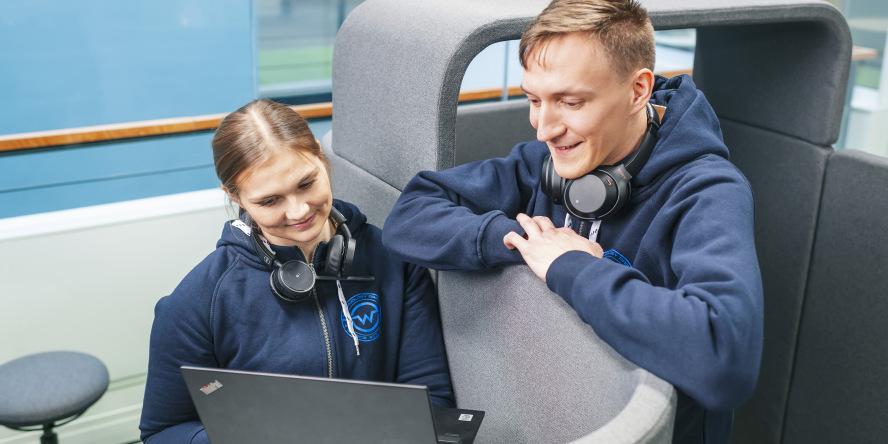
Continuous development is part of Wapice’s culture
- learning
- people
- culture
- competence
In a digitizing world new technologies are constantly emerging and even old frameworks are evolving. It’s important for software industry professionals to keep their skills updated, and even people in enabling support functions can’t trust that once acquired skills suffice in the future.
Competence development and learning are an essential part of Wapice’s culture. A few years ago, when we were forming our culture together at Wapice, we chose Passion to be ahead as one of our three values. In the definition of the value we emphasized the idea of a learning organization, new innovations and the will to pave the way rather than following what others do. Everyone is allowed to be themselves at Wapice just as they are, but this value unites our experts regardless of experience level and location. This mindset is also vital when looking for new colleagues.
Learning stems from everyone's own needs
At Wapice everyone’s personal starting level of skills, learning targets and career dreams are recognized already in the recruitment process. This journey continues throughout the employment lifecycle, and learning targets are updated in regular well-being and development discussions. Worktime can be flexibly used for e.g., company sponsored Udemy and Coursera courses, as long as they support your own and Wapice’s development goals. In addition, e.g. those working with cloud platforms can also complete relevant technology certifications. Internally we have also developed our own certifications (on topics such as SDLC, Secure Development Life Cycle). In addition to technological know-how, we also invest in staying on top of software industry trends, for example about DevOps principles, testing, security, and work efficiency. Last year we also trained 48 Scrum Masters together with our training partner Contribyte.
In the end we still believe that only roughly 10% of learning comes from formal trainings. More important is the everyday cooperation with colleagues and our customers, as well as receiving and giving feedback. Mentoring and sparring of bottleneck situations on Mattermost channels are also regular methods in use daily. In everyday project life completed and upcoming tasks are reflected in code reviews, dailies, and retros. Courses someone has studied are shared to others by writing about it in our internal Knowledge Base or by hosting a customer training on the topic. But even more important is learning by doing, i.e. by doing the work yourself in challenging and interesting projects. This is also the essence of the well-known 70–20–10 model of competence development.
Career paths give direction for personal development
Titles have never been a defining factor about someone’s value in Wapice, and people aren’t fitted to just a single skill profile. We rather see people as individuals and everyone can move between very diverse tasks, which also develops competence. In our structures we have still developed models that help a motivated Software Designer Trainee to grow over time from Senior Designer to Software Architect. For some, it may be more typical to delve into technology development after achieving a certain level of expertise, while for another, it is more exciting to manage clients and projects, and for a third, people leadership is the thing. All of these are reflected in the career paths built around our typical roles, such as Software Designers and Data Scientists.
” Even the first given task at Wapice offered a good deal of challenge compared to my experience level. Solutions weren’t given on a silver platter but mentoring and support was available whenever I needed it. Experimenting and learning have always been seen as good things here at Wapice, which has significantly influenced me enjoying my time here and also on my career development.” – Lassi Niemistö, former Software Designer Trainee, current Head of DevOps, Quality & Security Solutions
In a changing world a lot is happening all the time. In this environment continuous development is clearly the core of a software business, but this alone is not enough. Other skills are also needed in (work)life, such as self-management, resilience, interaction skills, emotional intelligence and the ability to resolve conflicts. Often these are even more important. “Soft skills are hard skills”, as they say. At Wapice, these things are also seen as important and we know that as fallible human beings, we are never ready. The key thing is the journey and the right direction.
Author

Antti Reijonen
About the author:
Wapice’s People & Culture Manager Antti works at Wapice with employee experience, culture and candidate experience. Antti believes that people are the company’s everything.